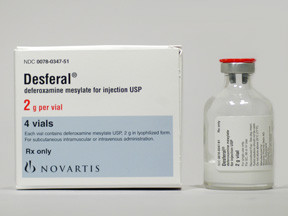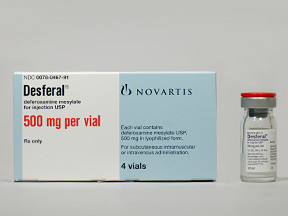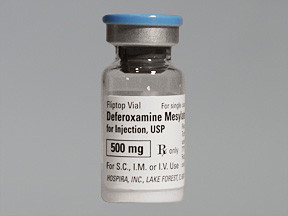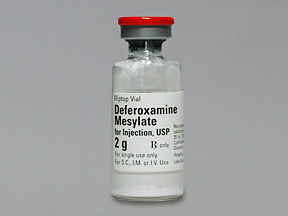DEFEROXAMINE - INJECTION
PHONETIC PRONUNCIATION: (deff-er-OX-uh-meen)
COMMON BRAND NAME(S): Desferal
GENERIC NAME(S): deferoxamine mesylate
Uses
USES: This medication is used along with other treatments (such as causing vomiting with syrup of ipecac, stomach pumping) to treat sudden iron poisoning. It is most effective when given as soon as possible after the iron was eaten. This medication can also be used to help get rid of iron in patients with high iron levels due to many blood transfusions. Deferoxamine is an iron-binding agent that belongs to a class of drugs known as heavy metal antagonists. It works by helping the kidneys and gallbladder get rid of the extra iron. This medication is not recommended for use in children less than 3 years old (see also Precautions section).
How to use DEFEROXAMINE - INJECTION
HOW TO USE: Depending upon your medical condition, this medication is injected directly into a muscle, under the skin, or into a vein as directed by your doctor. Dosage is based on your medical condition and response to treatment. If you are giving this medication to yourself at home, learn all preparation and usage instructions from your health care professional. Before using, check this product visually for particles or discoloration. If either is present, do not use the liquid. Learn how to store and discard medical supplies safely. If you are using this medication to treat high iron levels, your doctor may direct you to take vitamin C (ascorbic acid) after you have been using this medication for at least 1 month. Taking vitamin C will help replace the loss of vitamin C due to high iron levels and help the medication work to get rid of the iron. If you have heart disease (such as heart failure), tell your doctor before taking vitamin C while using this medication (see also Drug Interactions). The manufacturer recommends that adults using this drug take no more than 200 milligrams of vitamin C a day. Tell your doctor if your condition persists or worsens.
Side Effects
Precautions
Interactions
Overdose
Images
Reviews
Faq for DEFEROXAMINE - INJECTION
Deferoxamine injection is used to treat acute iron poisoning and chronic iron overload in patients receiving multiple blood transfusions.
Deferoxamine works by binding to excess iron in the body and helping its elimination through urine.
Deferoxamine injection is usually administered under the supervision of a healthcare professional through a slow intravenous infusion.
Common side effects of Deferoxamine injection may include allergic reactions, injection site reactions, gastrointestinal disturbances, and visual disturbances.
Deferoxamine injection should only be used during pregnancy if the benefits outweigh the potential risks to the fetus. It is typically reserved for life-threatening iron poisoning or severe iron overload cases.
Yes, Deferoxamine injection can be used in children for the treatment of iron overload due to multiple blood transfusions.
The duration of treatment with Deferoxamine injection depends on the individual's condition and response to therapy. It may vary from a few days to several months or even years in case of chronic iron overload.
Deferoxamine injection may interact with certain medications, such as vitamin C, antacids, anticoagulants, or aluminum-containing medications. It is important to inform your healthcare provider about all the medications you are taking before starting Deferoxamine therapy.
If you miss a dose of Deferoxamine injection, contact your healthcare provider immediately for further instructions. It is important to complete the full course of treatment for effective management of iron overload.
Disclaimer
IMPORTANT: HOW TO USE THIS INFORMATION: This is a summary and does NOT have all possible information about this product. This information does not assure that this product is safe, effective, or appropriate for you. This information is not individual medical advice and does not substitute for the advice of your health care professional. Always ask your health care professional for complete information about this product and your specific health needs.





No Reviews Yet